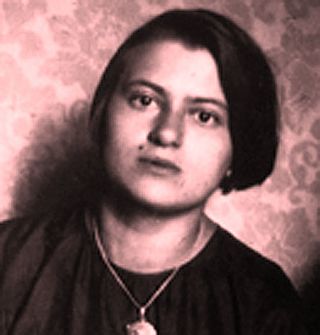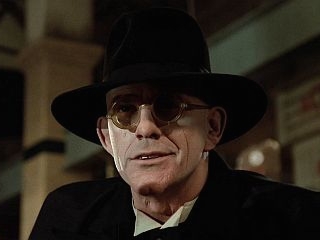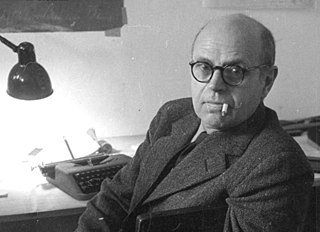Related Research Articles

Porky Pig is an animated character in the Warner Bros. Looney Tunes and Merrie Melodies series of cartoons. He was the first character created by the studio to draw audiences based on his star power, and the animators created many critically acclaimed shorts featuring the character. Even after he was supplanted by later characters, Porky continued to be popular with moviegoers and, more importantly, the Warners directors, who recast him in numerous everyman and sidekick roles.

A halogen lamp is an incandescent lamp consisting of a tungsten filament sealed in a compact transparent envelope that is filled with a mixture of an inert gas and a small amount of a halogen, such as iodine or bromine. The combination of the halogen gas and the tungsten filament produces a halogen-cycle chemical reaction, which redeposits evaporated tungsten on the filament, increasing its life and maintaining the clarity of the envelope. This allows the filament to operate at a higher temperature than a standard incandescent lamp of similar power and operating life; this also produces light with higher luminous efficacy and color temperature. The small size of halogen lamps permits their use in compact optical systems for projectors and illumination. The small glass envelope may be enclosed in a much larger outer glass bulb, which has a lower temperature, protects the inner bulb from contamination, and makes the bulb mechanically more similar to a conventional lamp.

Verner Panton is considered one of Denmark's most influential 20th-century furniture and interior designers. During his career, he created innovative and futuristic designs in a variety of materials, especially plastics, and in vibrant and exotic colors. His style was very "1960s" but regained popularity at the end of the 20th century. As of 2004, Panton's best-known furniture models are still in production.

Marianne Brandt was a German painter, sculptor, photographer, metalsmith, and designer who studied at the Bauhaus art school in Weimar and later became head of the Bauhaus Metall-Werkstatt in Dessau in 1928. Today, Brandt's designs for household objects such as lamps and ashtrays are considered timeless examples of modern industrial design. She also created photomontages.

The Edith Farnsworth House, formerly the Farnsworth House, is a historical house designed and constructed by Ludwig Mies van der Rohe between 1945 and 1951. The house was constructed as a one-room weekend retreat in a rural setting in Plano, Illinois, about 60 miles (96 km) southwest of Chicago's downtown. The steel and glass house was commissioned by Edith Farnsworth.

A gobo is an object placed inside or in front of a light source to control the shape of the emitted light and its shadow.

Thunderbird 6 is a 1968 British science fiction puppet film based on Thunderbirds, a Supermarionation television series created by Gerry and Sylvia Anderson and filmed by their production company Century 21 Productions. Written by the Andersons and directed by David Lane, it is the sequel to Thunderbirds Are Go (1966).

Judge Doom is a fictional character and the main antagonist in the 1988 film Who Framed Roger Rabbit, portrayed by Christopher Lloyd. He is depicted as the much-feared, cruel, and evil judge of Toontown, who later in the film is revealed as the mastermind behind the framing of the titular character and the murder of protagonist Eddie Valiant's brother.

Spider-Man is a 1981–1982 American animated TV series based on the Marvel Comics character of the same name. It is the second Spider-Man cartoon, following the 1967 series.

Poul Henningsen was a Danish author, critic, architect, and designer. In Denmark, where he often is referred to simply as PH, he was one of the leading figures of the cultural life of Denmark between the World Wars.

Chalkware is an American term for popular figurines either made of moulded plaster of Paris (usually) or sculpted gypsum, and painted, typically with oils or watercolors. They were primarily created during one of three periods: from the late 18th century to the beginning of the 20th century, during the Great Depression, and during the 'mid-century modern' era as decorative lamps, figurines and wall decor from the 1940s-1960s. Those created during the earlier period were intended as a more serious decorative art, often imitating the more expensive imported English Staffordshire potteries figurines such as Staffordshire dog figurines; those during the second period, by contrast, were more typically somewhat jocular. Early chalkware was often hollow and is difficult to find unblemished.

Achille Castiglioni was an Italian architect and designer of furniture, lighting, radiograms and other objects. As a professor of design, he advised his students "If you are not curious, forget it. If you are not interested in others, what they do and how they act, then being a designer is not the right job for you."
The architecture of Israel has been influenced by the different architectural styles of those who have inhabited the country over time, sometimes modified to suit the local climate and landscape. Byzantine churches, Crusader castles, Islamic madrasas, Templer houses, Arab arches and minarets, Russian Orthodox onion domes, International Style modernist buildings, sculptural concrete Brutalist architecture, and glass-sided skyscrapers all are part of the architecture of Israel.
Joseph Tanney is an American architect based in New York City. He is known for his work in prefabricated housing. He gained international attention with the Dwell Home, the winner of a 2003 international competition, which is considered a modern prefab icon.

The Shire Hall is a public building in Stafford, England, completed in 1798 to a design by John Harvey. Formerly a courthouse, it housed an art gallery which closed to the public in July 2017. The court rooms and cells are preserved. The building, its interiors, and the associated street furniture were grade II* listed on 17 December 1971, when it was described as "One of the finest public buildings in Stafford".
Protocell Circus (2010), produced by Dr. Rachel Armstrong and Michael Simon Toon, is the first film to show the recognizable lifelike behavior of laboratory-created protocells.
Thought Moments (2004) is an anthropological short film in the style of cinéma vérité by Michael Simon Toon. Toon, a former Buddhist monk, titled Thought Moments after the Buddhist term for the mental states we experience when a physical or mental object enters the mind. The film is used in the study of microexpressions, eye accessing cues, and the universality of facial expressions.
Winka Dubbeldam is a Dutch architectural designer and academic. After her education in architectural design at Columbia University, she established her own firm, Archi-Tectonics, in 1994 in New York City. Her use of a combination of sustainable materials, innovative and inventive building methods with adoption of digital techniques has rewarded her with many accolades for her architectural projects. She has earned a reputation as a leading figure in modern architectural designs which has also made her "a real estate newsmaker". She is a Professor and Chair of architecture at the University of Pennsylvania. She is also the RIBA External Examiner for the Bartlett UCL London [2018-2022], the Creative Director for the Venice Biennale Virtual Italian Pavillion [2021]. Her Ted talk “Crowdfunding Urban Planning” was in TED Global in Edinburgh Scotland 2013.
Full Grown is a UK company that grows trees into chairs, sculptures, lamps, mirror frames and tables. It was co-founded by Gavin Munro in 2005.
References
- ↑ McGhie, Caroline (26 October 2002). "The rise of Modernist, eco-friendly home". The Telegraph. Archived from the original on 17 October 2012. Retrieved 8 August 2013.
- ↑ "Thought Moments". British Films Directory. 12 January 2009. Retrieved 13 September 2017.
- ↑ Ragodí, Prof. (19 November 2009). "Trabajo Psicología de 1er Trimestre El Bigote de Bernays". Blogspot. Retrieved 13 September 2017.
- ↑ Hakan, Mirac (18 March 2010). "Eye Accessing Cues". YouTube. Retrieved 13 September 2017.
- ↑ "Thought Moments". YouTube. 13 May 2011. Retrieved 13 September 2017.
- ↑ "Protocell Video by Michael Simon Toon." proto-futures: all things related protocell technology. Updated 27 October 2012.http://weheartprotocells.tumblr.com/post/34408108701/protovideo
- ↑ "Rachel Armstrong: Applied scientist, innovator." Speakers, Ted.com. (c) TED Conferencing LLC. Accessed 7-31-13. http://www.ted.com/speakers/rachel_armstrong.html
- ↑ Schmidt, Marcus. "Production of synthetic biology in science, media, film and art." Life Workshop. Presentations of the meeting of the German Ethics Council 2011. Berlin. (C) 2013 German Ethics Council. Page 36.https://translate.google.com/translate?hl=en&sl=de&tl=en&u=http%3A%2F%2Fwww.mpg.de%2F7423611%2Fwerkstatt_leben_tagungsdokumentation.pdf
- ↑ "Digital Art@Google: We Write This To You From The Distant Future." 20 August – 22 October 2010. TheProjectRoom.org. http://theprojectroom.org/digitalartatgoogle2
- ↑ "Living Chemistry & A "Natural History" of Protocells." © Synth-ethic: Art and Synthetic Biology Exhibition 2013. 14.05 – 26 June 2011 in the Natural History Museum, Vienna, Austria. Produced by Biofaction KG. Added 20 April 2011 21:09. http://www.biofaction.com/synth-ethic/?p=61 Archived 9 March 2016 at the Wayback Machine
- ↑ "Concept home sold off-plan for £2m". Business Live. 25 April 2008. Retrieved 22 August 2023.
- ↑ "Cannon Pendant Lamp Shade." Inspirations. Fab.com. Updated 2012. http://fab.com/inspiration/cannon-pendant-lamp-shade
- ↑ McGhie, Caroline. "The rise of Modernist, eco-friendly home." The Telegraph. Posted 26 October 2012. Accessed 8 August 2013. https://www.telegraph.co.uk/property/9611852/The-rise-of-the-Modernist-eco-friendly-home.html
- ↑ "House Prices in Staffordshire." RightMove.com. Retrieved 30 July 2013.http://www.rightmove.co.uk/house-prices-in-Staffordshire.html
- ↑ Post, Birmingham (25 April 2008). "Concept home sold off-plan for £2m".
- ↑ "Si-Huis". www.facebook.com. Retrieved 28 June 2023.
- ↑ "Si-Huis Bi-Plane Floor Lamp." Houzz.com. (C) 2013 Houzz Inc.http://www.houzz.com/photos/1082338/Si-Huis-Bi-Plane-Floor-Lamp-modern-floor-lamps-los-angeles
- ↑ "Bi-Plane Floor Lamp." Inspirations. Fab.com. Updated 2012. http://fab.com/inspiration/bi-plane-floor-lamp
- ↑ "So into this design on Fab! Cannon Pendant Lamp Shade #FabForAll". Fab.com.
- ↑ " Si-Huis Crane Lights, illuminated by other Si-Huis Crane Lights. Carbon fiber composite, polyester and rubber. Designed for the Philips Hue bulb. Design and build by MST." California Design and Build. Facebook Page. Posted 17 January 2013 8:04. https://www.facebook.com/photo.php?fbid=600259969989975&set=a.600222599993712.154333.120894934593150&type=1